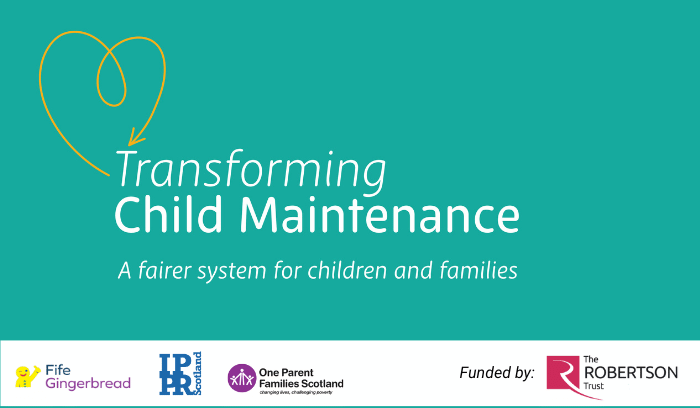Transforming Child Maintenance

Transforming Child Maintenance is a two-year partnership project between Fife Gingerbread, Institute for Public Policy Research (IPPR) Scotland, and One Parent Families Scotland, funded by The Robertson Trust. The project will work with parents, practitioners, and policymakers to make the case for a fairer system for children and families.
We believe that children have a right to fair financial support from both parents wherever possible to ensure their health, happiness and wellbeing.
At the moment, this is not the reality for too many children. In 2021, the National Audit Office found that only one in two separated families with children have an arrangement where at least some child maintenance is received, and only a third have an arrangement that is satisfied in full.
Our aims
- To make evidence-based recommendations to achieve systemic and transformational change to the UK child maintenance system.
- To develop options where the Scottish Government are devolved further powers to make the child maintenance delivery process more efficient and effective.
- To develop and test, within the existing status quo, new approaches to child maintenance locally – working with families to enable an increase in the successful receipt of child maintenance for children.
What we’ll be doing
- Fife Gingerbread will support single parents in Fife to navigate the child maintenance system, pilot and evaluate training for local practitioners, and develop and test new local approaches within Fife to inform recommendations for other local areas.
- IPPR Scotland will deliver focus groups with paying parents, commission and analyse polling on public opinion around child maintenance, carry out workshops and interviews with professionals with expertise in child maintenance, and use statistical analysis to create ‘models’ showing the impact and cost of different possible new approaches to the child maintenance system.
- One Parent Families Scotland will deliver focus groups with single parents and support a group of Single Parent Experts to help shape and test the project recommendations through a series of workshops, ongoing communications and participation activities.
- Together we will work with other partners on an Advisory Group which will meet regularly will include both receiving and paying parents.
- We will also work together to produce a plan for how to share these findings widely and campaign for all levels of government to make changes based on the recommendations.
Over the course of this project, this page will be updated with new developments, findings, and the voices of parents taking part.
More information related to Child Maintenance
- Find out more about the how to arrange child maintenance and what the Child Maintenance Service can do.
- One Parent Families Scotland provides the joint Secretariat for the All-Party Parliamentary Group (APPG) on Child Maintenance Services along with Gingerbread. Find out more about the APPG.
- Speak to other parents about your experiences of child maintenance on our Parent Forum.
- If you are a parent living in Fife who would like support with your child maintenance claim, contact Fife Gingerbread on 01592 725 210.
Service
Related media articles and publications
Read relevant publications from the project partners on the topic of child maintenance.
Service
News from Fife Gingerbread and IPPR Scotland
Read blogs and research from our Transforming Child Maintenance project partners
Service
Parent voices
Read the stories of resident and non-resident single parents talking about their experiences of child maintenance and the Child Maintenance System.
Latest News
View all newsSingle not single
10/06/2024
Imprisonment denies families access to #ChildMaintenance through not fault of their own- guest blog by Nancy Loucks, Chief Executive of Families Outside.
UK Government child maintenance consultation
06/06/2024
This consultation is open to voluntary and community sector organisations, as well as Child Maintenance Service customers and members of the general public. It seeks views on a number of proposals, which include eliminating Direct Pay.
Single Parent FAQs: Child Contact Arrangements – Issue 30
27/05/2024
Answers to the most frequently asked questions on Child Contact Arrangements.